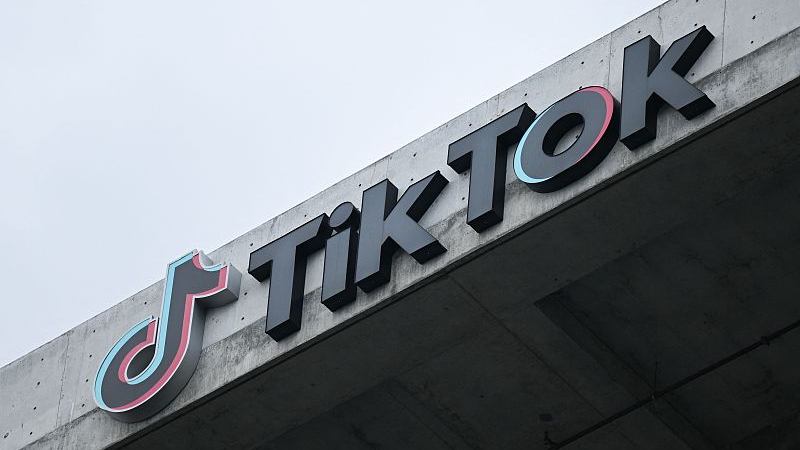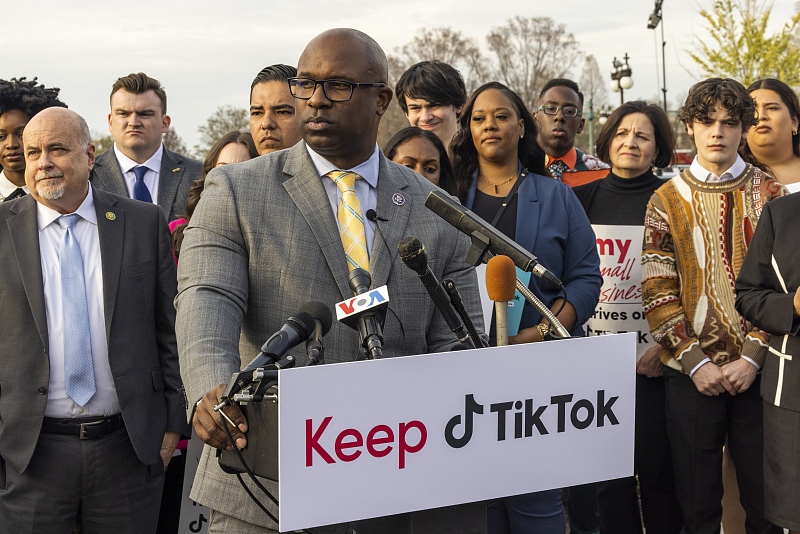
TikTok logo displayed on signage outside TikTok's social media app company office in Culver City, California, March 16, 2023. /CFP
TikTok logo displayed on signage outside TikTok's social media app company office in Culver City, California, March 16, 2023. /CFP
Editor's note: Daryl Guppy is an international financial technical analysis expert. He has provided a weekly Shanghai Index analysis for media for the Chinese mainland for more than a decade. Guppy appears regularly on CNBC Asia and is known as "The Chart Man." He is a former national board member of the Australia China Business Council. The article reflects the author's opinions and not necessarily the views of CGTN.
One of the world's most popular social media apps – TikTok – is being relentlessly targeted by the U.S. The U.S. has told the Chinese owners of the video-sharing app that they must sell their shares or risk the app being banned in the U.S.
The Treasury Department is leading the discussion through the Committee on Foreign Investment in the U.S. and recently made the demand to TikTok's owner. TikTok's leadership has discussed the possibility of separating from its Chinese parent, ByteDance, to help resolve concerns about national security risks. It's possible TikTok's owners could retain some form of ownership but through a passive structure.
The story promoted by the U.S. is that TikTok poses a security risk for users. Apparently, it's a security risk in the way that the misuse of personal data by Facebook, Instagram, Twitter, Google, YouTube and others in scandals, including Israeli Pegasus spyware and Cambridge Analytica is not. It's apparently a larger risk than that posed by Western surveillance capitalism which bombards consumers based on access to personal data commercialized without customer permission by the U.S. tech companies.
Apparently it is not a security risk when platforms like Facebook and YouTube share information with the federal government. Police also gain access to personal data collected by private companies, including data from doorbell cameras, microphones in Amazon's home Alexa devices, and data in DNA databases that people pay to enter.
Canada, the UK and other U.S. allies are blindly following the lead, and unknowingly assisting what looks more like a policy of corporate theft rather than a security issue.
These demands suggest that TikTok security concerns are a smokescreen for the operation of mafia-style capitalism where standover tactics are used to destroy the competition through State enabled theft.
If TikTok is handed over to a U.S. company then, just like magic, all the security concerns disappear. It's still the same application, the same programming, the same product, but now it's controlled by a U.S. company.
"If protecting national security is the objective, divestment doesn't solve the problem: a change in ownership would not impose any new restrictions on data flows or access," TikTok spokeswoman Maureen Shanahan said.
The company agreed last year to implement several changes to address security concerns. The Project Texas proposal includes bringing in American tech giant Oracle to host U.S. user data and review its software, and appointing a three-person government-approved oversight board. Many of the moves are already under way.

The U.S. representative for New York's 16th congressional district Jamaal Bowman speaks as TikTok content creators gather to voice their opposition to a potential ban on the app in Washington D.C., U.S., March 22, 2023. /CFP
The U.S. representative for New York's 16th congressional district Jamaal Bowman speaks as TikTok content creators gather to voice their opposition to a potential ban on the app in Washington D.C., U.S., March 22, 2023. /CFP
TikTok has poured $1.5 billion into Project Texas but it is still not enough to satisfy American legislators who effectively want to do nothing less than kill the competition or steal the company.
It is no accident that when faced with competition from China, the U.S. approach is not to outcompete. The approach is to sabotage, to bully, and to undermine the competition just like the mafia controls business in their territory. If you can't beat it, then steal it or kill it seems to be the policy approach but you need an excuse, which in this case, is the all-encompassing security concern.
Currently this approach is applied to China, but the same approach was applied decades ago to Japan as their superior products out-competed the American's. Japanese cars brought a higher standard of quality to the market at a time when consumers described some American cars as "unsafe at any speed."
Rather than compete, the Americans imposed substantial tariffs in an attempt to make Japanese cars uncompetitive. The same bully-boy approach was applied to Huawei and is now being imposed on the wildly-popular TikTok. The security story is a smokescreen that hides the real issue. The beauty of the smokescreen is that it does not have to be explained because, well, because of security concerns that cannot be fully shared with the public. As a matter of fact, America is unable to compete with TikTok so their only response is to destroy it.
It's an open question as to what its allies will do if the U.S. is successful in forcing the handover of TikTok to U.S. control. From a U.S. perspective that makes TikTok no longer a security risk, but it would be an egg-on-the-face moment for allies. Would they lift TikTok restrictions, or persist in the falsehood that the new U.S.-owned TikTok remained a security risk?
After swallowing the security and intelligence services' lies about Weapons of Mass Destruction, it would be reasonable to think these allies would be wary of these U.S.-generated security scares. It would be much better if these allies realized the true purpose of U.S. moves against TikTok and had the courage to stand up to mafia-style capitalism rather than blindly becoming accomplices.
(If you want to contribute and have specific expertise, please contact us at opinions@cgtn.com. Follow @thouse_opinions on Twitter to discover the latest commentaries in the CGTN Opinion Section.)